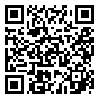BibTeX | RIS | EndNote | Medlars | ProCite | Reference Manager | RefWorks
Send citation to:
URL: http://jdisabilstud.org/article-1-2408-en.html

 , Mohammad Ali Besharat *2
, Mohammad Ali Besharat *2 
 , Mohammad Reza Belyad1
, Mohammad Reza Belyad1 
 , Marjan Hosseinzadeh Taghvaei1
, Marjan Hosseinzadeh Taghvaei1 
 , Parisa Peyvandi1
, Parisa Peyvandi1 

2- Department of Psychology, Faculty of Psychology and Education, University of Tehran
Background & Objectives: Spinal Cord Injury (SCI) is one of the traumatic events that has a huge impact on the quality of life, growth and development of the injured patient. Several factors affect mental health in SCI patients, but the most important ones affect different aspects of personality and adaptation, such as ego strength, self-knowledge, depression and stress anxiety. Each set of these factors can be introduced as a path-breaking outcome in improving the psychological state of patients with SCIs. To achieve the desired level in these prominent personality and mood factors, flexible treatment approaches are needed. In fact, beneficial intervention in SCI patients should include features that help them to accept their existing situation, to step forward with strength, to achieve goals and progress, and prevent psychological consequences. This study aimed to evaluate the effectiveness of paradox therapy with the PTC model (Paradox + Timetable = Cure) on ego strength, self-knowledge, and anxiety depression stress in a patient with SCI.
Methods: This research method was quasi-experimental with a single-subject design that was performed using the baseline-intervention-follow-up. The study population includes female patients suffering from SCI who were members of the Spinal Cord Injury Association of Tehran Province, Iran, in 2019. They were between 20 and 40 years old with the SCI injury at least five years and at most 10 years earlier. The subject of the present study was randomly selected from 60 female participants, who underwent conventional rehabilitation treatments. She entered the study with written informed consent. The first meeting was dedicated to obtaining informed consent and filling out the baseline questionnaires (pretest). The first treatment session was held one week later. Measurements were performed in the fourth session for the posttest and one month later for follow-up evaluation. Research instruments included Ego Strength Scale (ESS) (Beshrat, 2017), Integrative Self-Knowledge Scale (ISK) (Ghorbani et al., 2008), the Stress Anxiety Depression Scale (DASS-21) (Lovibond and Lovibond, 1995), and Treatment Outcome Subjective Rating Scale (TOSRS) (Besharat, 2003). Descriptive statistics, including the percentage change in posttest and follow-up scores compared to the pretest scores, were used for analyzing the collected data.
Results: The results showed that the PTC psychotherapy model is effective. In the posttest stage, the score of Integrative Self-Knowledge reached 40, which showed an increase by 29%. Ego Strength increased by 15% and reached 77, and each of the stress anxiety depression items improved one score, which is a 24% progress. These changes were maintained during the follow-up period for Ego Strength and increased slightly for Integrative Self-Knowledge (16%) and improved to 29% in the symptoms of stress anxiety.
Conclusion: The PTC psychotherapy model is recommended as a very short-term, simple, effective, cost-effective and flexible approach in treating patients with spinal cord injuries.
| Rights and permissions | |
 |
This work is licensed under a Creative Commons Attribution-NonCommercial 4.0 International License. |

